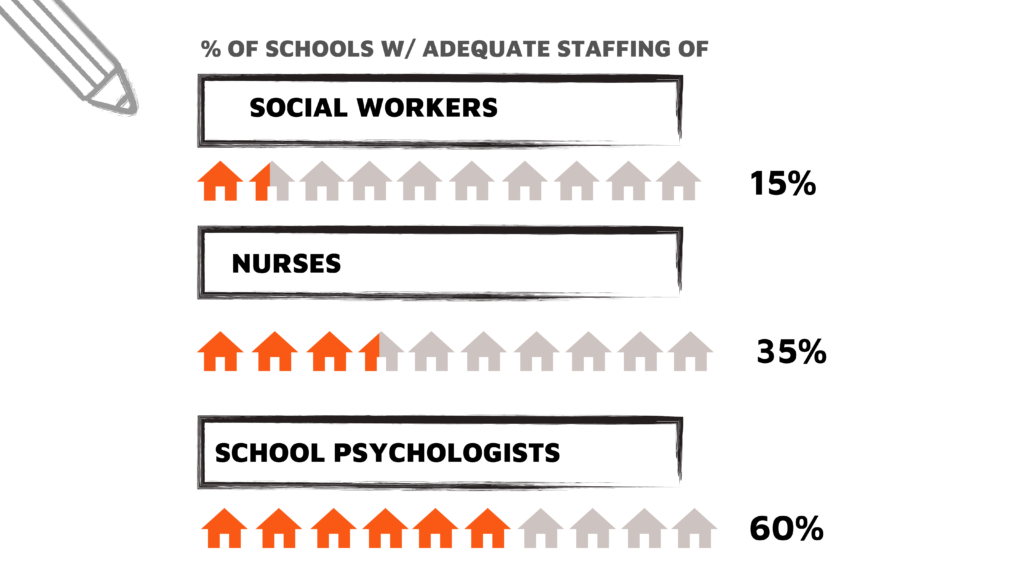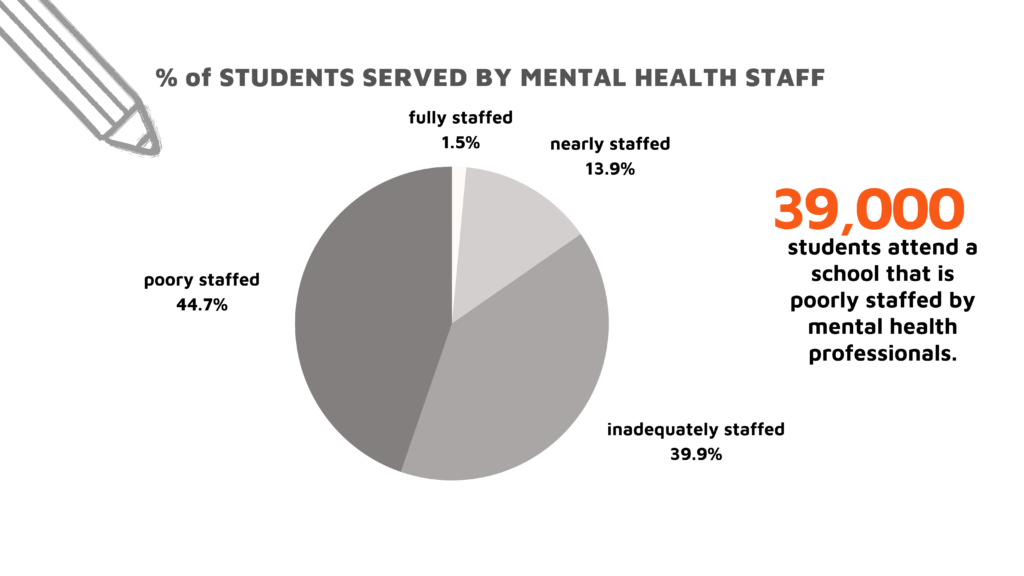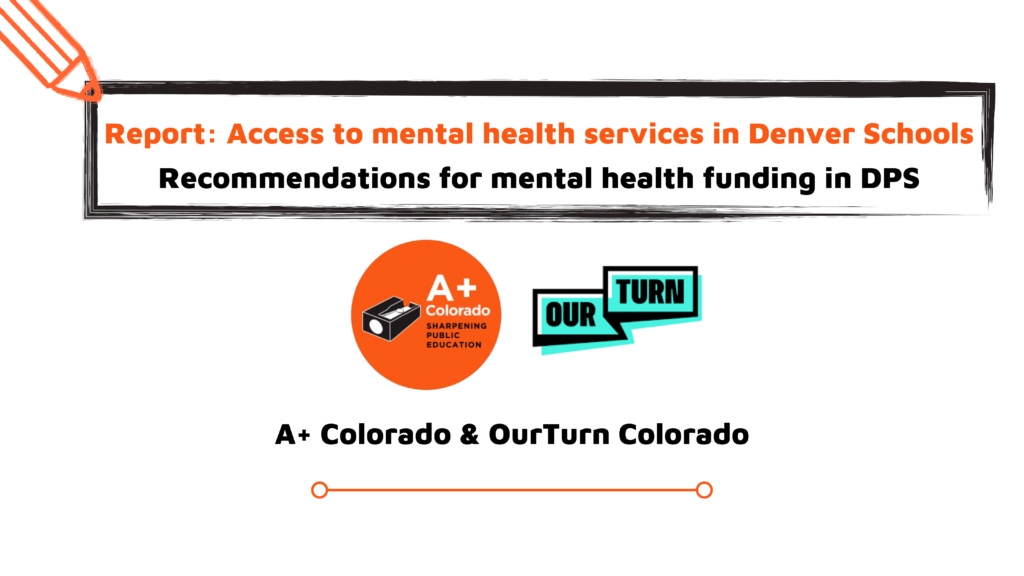Student activists from Our Turn Action Network and the Director of Research at A+ Colorado, Eden Morrision, will testify Monday at the DPS Budget Advisory Committee (BAC) meeting at 3:30 p.m. regarding the $3 million earmarked for mental health support from the Mill Levy Override Funds. While DPS continues to strive to meet the mental health needs of its students, approximately 39,000 students attend DPS schools that are poorly staffed by mental health professions.
Below, you’ll find the stories of student activists with Our Turn who discuss the importance of this issue for themselves and students across Colorado. You’ll also find a full report by A+ which shows its original research findings based on data it received through CORA requests and recommendations for the budget allocation for the BAC.
Este reporte también está disponible en Español aquí.
Student Voice
‘We had to be our own support system:’ The lived experiences of these students inspired them to advocate for more dedicated mental health support in schools
When college activists with Our Turn, Amelia Federico, Salena Gebreyesus, and Isabelle Melendez were in middle and high school, the Denver Public Schools campuses they attended lacked dedicated mental health supports for students which continues to impact their lives after graduating from high school. A+ Colorado spoke with these students about their experiences with mental health support as part of a research collaboration.
“The mental health support system I had was in the form of an advisor, which was a teacher,” said Federico, a freshman at the Community College of Denver. Federico said that her AP English teacher was assigned as her advisor, and that was her resource for both academic and emotional support. “She’s not qualified to deal with my mental health struggles. That was the system that they had in place for students, because the social workers and the school psychologists had very limited capacities.”
Improving mental health support in schools is what Our Turn, a student-led youth activism organization is testifying about Monday, Jan. 11, during the Budget Advisory Committee meeting. When DPS schools do not have adequate mental health staffing for approximately 39,000 students, students looking for mental health support in schools are often asked to turn to non-qualified teachers, advisors, or staff members.
Students from OurVoice and staff from A+ are advocating for DPS to:
- Create permanent funding for trauma-informed practices through the Mill Levy Override funds to ensure the long-term stability of that work in accordance with the 2018 Board of Education Resolution declaring DPS a Trauma-Informed District.
- Spend the remaining balance of the money earmarked for mental health supports to establish a pilot program which staffs mental health counselors, whose primary responsibility would be supporting DPS improving mental health outcomes for students.
“What brought me into this work and kind of why this work matters to me is actually like my lived personal experience with my life, my own mental health struggles, and then seeing that not being met with high support. I know that I’m not the only student who is feeling that way,” Federico said.
The funding from the Mill Levy is a bright spot in that it’s directly earmarked for student mental health, but with only ~$3 million dollars, Our Turn and A+’s recommendations center around creating long-term sustainable strategies that can be funded and implemented.
“It was hard managing the rigorous coursework, after school activities, at home duties, and on top of that being in an environment that was not very welcoming to students of color. It wasn’t until my junior year that we had received native Spanish speaking teachers and if it wasn’t for their support I would not have done well,” says Paola Gascot, a freshman at the University of Denver. Gascot wrote a testimony to be presented to the Advisory Committee regarding the effects from not receiving mental health supports in high school as a first-generation college student. “My college counselor spent her time being a mental health counselor rather than a college counselor which took away from the level of support I needed alongside other students.”
Melendez started her own peer mentoring program at her school when she realized that there wasn’t adequate support dedicated by the school. Upperclass students were paired with younger students to help navigate the rigorous transition into high school.
“There just really wasn’t that support, we did have a part time mental health counselor, but her access to her work was very limited,” she said. “You only really got to see her if you had a note from a doctor – you couldn’t just walk into her office and talk.”
These student activists are taking time out of their busy and stressful lives as college students to remind the DPS leaders that their voices should be heard at the forefront of this issue, which directly affects students themselves.
“I believe that everyone is a human being who goes through struggles and being alone in those struggles is the absolute worst,” Gebreyesus said. “Schools should not only provide education, but provide ways for people to dive deep within their own mental health.”
The following report is the culmination of a collaboration between A+ Colorado and Our Turn – A+ accessed mental health data through CORA about DPS mental health supports and provided recommendations for the earmarked funding based on existing DPS practices and needed additional supports for students. We will be releasing this report in Spanish on Wed., Jan. 13 as well.
Report and Findings
Authored by Eden Morrison, Director of Research and Stephen Fusco, VP of Research at A+ Colorado
Executive Summary
With nearly 1 in 6 children having a diagnosed mental, behavioral, or developmental disorder, students need vital supports to meet their social, emotional, and academic needs. In the December 2020 and earlier April 2020 district needs inventories conducted by the Colorado Department of Education and the Colorado Education Initiative, Colorado districts selected student emotional support as the top educational support needed. While nurses, social workers, and school psychologists are charged with addressing the mental health needs of students, there is inadequate school mental health staffing across Colorado.
In Denver County, the teen suicide rate is 23.2 per 100,000 and a 2018 Denver Public Health report found that 3 in 10 middle and high school students in Denver indicated that they felt so sad or hopeless almost every day for two weeks or more in a row that they stopped doing some usual activities.
Denver Public School’s (DPS) 2020 Plan prioritizes the whole child with a specific commitment to meet the social-emotional needs of all students. In realizing this commitment, Denver voters approved a Mill Levy Override (MLO) in November that included a ~$3 million dollar allocation for mental health services and those limited funds must be used to prioritize the most important mental health needs for DPS students.
Unfortunately, there are gaps in the provision of mental health supports for students in DPS. In our review of the FTE staffing allocations for mental health providers across DPS schools, 85% of DPS schools do not have adequate social worker staffing, 65% lack sufficient nursing staff, and 40% do not have adequate school psychologists. In total, approximately 39,000 students attend schools that are poorly staffed by mental health professions (Figures 1 & 2). We encourage readers to use our interactive dashboard to view the number of mental health professionals at each DPS school.


Based on DPS’ prior commitments to the mental and emotional well being of its students, there are two recommendations to address these concerns: (1) continue the funding of the District’s trauma informed practice supports; and (2) hire dedicated mental health counselors to exclusively address the social-emotional needs of students. These priorities are discussed at greater depth below.
Explore how well your school is staffed at the interactive dashboard below and see online here.
Background
The lack of access to mental health services in schools is well documented. Given the lack of access to behavioral health service providers across Colorado, students carry heavy mental health needs with them into the classroom. This situation is further complicated by the social-emotional impacts of COVID-19 and racial inequities across the country. Strapped with significant administrative tasks in many schools, school social workers, school psychologists, and nurses are unable to focus on the significant mental health needs of students. Experts recommend schools provide a continuum of school mental health services that encompasses: supports for all students, broad supports for at-risk students and intensive supports for the most high need students.
DPS’ Commitment
In recognition of DPS’ outstanding commitment to serve the needs of the whole child includes the, the District specifically pledged to support “school communities to develop and implement trauma-informed practices in a proactive, culturally-responsive, and systematic fashion with the intent to positively impact students, educators and communities” in 2018. This commitment was the impetus for the creation of the Trauma Informed Practices team.
Following the 2019-2020 school year, DPS expressed continued resolve to meet the mental health needs of students and faculty in light of the realities of the COVID-19 pandemic as they released the crisis priorities for the upcoming school year. Explicit goals and strategies outlined in this document include: “[a]ll schools provide trauma-informed social-emotional and mental health curriculum and supports that address the needs of students in their community under the COVID crisis, [e]xplore increased funding for schools to hire more counselors and external partnerships to support students, which can also address unfinished learning needs, [k]nowing the budgetary constraints, seek external partnerships to increase social, emotional and mental health supports and services.”
Our Research & Findings
In late November, A+ Colorado submitted a Colorado Open Records Act request to DPS seeking the following information (a) any and all documents related to the nurses, social workers, school psychologists, and other health providers (collectively “requested staff”) assigned to each school; (b) a list of all collective staff assigned exclusively to each school; and (c) a list of collective staff assigned to multiple buildings, which buildings they are assigned to, and a breakdown of the amount of time they spend at each building. DPS provided two spreadsheets with data responsive to our requests and those spreadsheets served as the basis for our analysis to answer the following research question:
- How well staffed are DPS schools as it relates to social workers, nurses, and school psychologists?
In answering this question, we used industry standards among the professional communities. The National Association of Social Workers (NASW) recommends a ratio of one school social worker to each school building serving up to 250 general education students and one per 50 students with intensive needs. The National Association of School Nurses (NASN) recommends the following: 1:750 for students in the general population, 1:225 in the student populations requiring daily professional school nursing services or interventions, 1:125 in student populations with complex health care needs, and 1:1 may be necessary for individual students who require daily and continuous professional nursing services. Finally, the National Association of School Psychologists (NASP) recommends that districts employ one school psychologist for every 500 to 700 students. For purposes of our research, we erred on the conservative side and used a ratio of 1:700.
Using the information provided by the district, the total number of FTE positions for each role (school psychologist, social worker, or nurse) were calculated at the school level and then divided by the student population at each school (with appropriate adjustments for those who split their time between buildings). Those ratios were then compared to the previously mentioned professional recommendations. Schools were then categorized on a scale as being fully, nearly, inadequately, or poorly staffed.
Based on our analysis, we noted several key findings.
- First, 85% of DPS schools do not have adequate social worker staffing, 65% lack sufficient nursing staff, and 40% do not have adequate school psychologists.
- Second, in terms of the percentage of students who attend schools with adequately funded mental health providers across all three categories, the results are bleak – only 2% of DPS students attend schools with adequately funded social workers, nurses, and school psychologists. 45% of DPS students attend schools where none of these mental health providers are adequately funded.
- Finally, 14% of DPS students attend schools where at least two of the three mental health providers are funded and 40% of DPS students attend schools where only one of the three mental health providers are adequately funded. Based on these findings, approximately 39,000 students attend schools that are poorly staffed by mental health professions. These findings are highlighted above in Figures 1 and 2.
Recommendations
In order to address some of the needs described above, we offer the following recommendations that came from collaborative work between Our Turn and Mental Health Colorado, Maria Droste Counseling Center, Clinica Tepayac, Colorado Youth Congress, and DPS’ Office of Student Equity and Opportunity:
- Maintain DPS’ commitment to use trauma informed practices to support the mental health needs of students.
In keeping with expert advice about and DPS’ expressed commitment to district wide support for all students’ mental health, we recommend a portion of the funding go to maintaining the Trauma Informed Practices team. Since 2018 the Denver Public School system has invested in preparing faculty and staff to meet the mental health needs of students through its investment in trauma informed practices. Funded through a partnership with The Campbell Foundation, the trauma informed practices include “ a four-part strategy that provides training and coaching for trauma-informed practices, including the development of an official trauma certification for DPS staff. It will also help create educational environments that recognize when learning and behavior challenges could have trauma as the root cause.”
- Hire mental health counselors as part of a pilot program in select DPS schools with the remaining override dollars.
Examining staffing in DPS reveals that over 39,000 students are in schools that are understaffed by mental health professionals (figure 1). Utilizing this money to increase staffing of professionals whose primary role is to address students’ mental health needs would provide students with more access to mental health professionals and collectively lower caseloads for mental health staff. Staffing goals should approach professional recommendations (1:250 social workers, 1:750 for nurses, 1:700 school psychologists) with the first round of allocations given to schools with the highest student populations, comprehensive programs, and high schools since these are the schools that most often failed to provide adequate funding in multiple categories.
While there is no one service or plan that will meet the mental health needs of all students, DPS must establish meaningful community partnerships. This shared responsibility provides support for school-based mental health professionals by making caseloads more manageable and allowing them to meet all their job requirements without feeling overwhelmed. The logistics of such a partnership require clear guidance on information sharing and responsibilities as well as regular evaluation of program effectiveness. Given the existing working relationship between DPS and community organizations (such as MHCD, etc.), expanding these relationships would be feasible and warranted.
Additionally, the proposed allocation of ~$3 million is the beginning of a commitment to more accessible and beneficial mental health care within DPS. This amount, while significant, is not enough to provide all students with the support for mental health that is required to succeed academically. This initial investment and a promise of more funds in the future brings with it the opportunity to provide innovative, data-driven, school based mental health to students in DPS. To that end, DPS should pilot the aforementioned interventions and evaluate their effectiveness in a representative sample of schools. Doing so would give the district information on which programs would be able to best meet their students’ needs. Offering a pathway for implementing large scale programs with proven efficacy across the district.
Interactive Dashboard
Explore how well your school is staffed.
Footnotes:
1. Staff assigned to 1:1 positions or those assigned to district wide, managerial positions were not included in this analysis.
2. A+ estimates that $2.5 million would provide the ability to hire one FTE position (compensation of $50,000-$60,000) at 40-50 schools in the district.
Downloadable PDF here:
